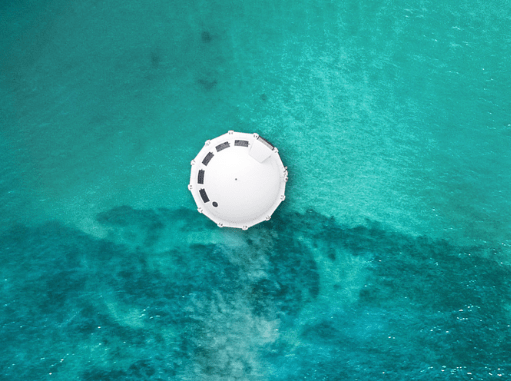
In La Tribune 14/06/2022
Fear of rising waters; refusal to use oil, gas, coal, wind or nuclear energy; refusal to live crammed on the coastline of the nearest sea; fear of an ecological future and an anxiety-provoking life, the energy transition occupies conversations and darkens the future of the youngest who refuse a life and a habitat that destroys the planet. Symptomatic of these anxieties, the refusal to give birth to children in such an imperfect world.
Yet these traumas, exacerbated by the Covid-19 crisis, have a solution that already exists: an ecological house that will revolutionize the future.
In New York Harbor or on the pond of Leucate
Imagine such a house in the Bay of Arcachon or on the island of Ré, in the Gulf of Morbihan or on the Pink Granite Coast. Imagine it on the Seine River with a view of the Eiffel Tower and replacing old barges, on the Garonne River in Bordeaux, in Lyon on the Rhone, in Geneva on the Lake or in the port of New York; but also on the pond of Leucate, next to the fishermen’s village of L’Ayrolle, in the Camargue, in the creeks of Marseilles, off the islands of Levant or Lerins, in Corsica. It will also be all around the Mediterranean Sea, in the West Indies, in Polynesia, in Oceania and in the Far North… Anthénea is this house and the first two models will be anchored off Qatar and Oman in August and October 2022.
One of its qualities is its energy autonomy. If it were a country, it would be ahead of New Zealand or Iceland, countries that are more than 80% self-sufficient in green electricity, because it runs on 100% sunlight. The solar energy it generates is either consumed immediately in lighting, home automation, air conditioning or stored on an ionic battery. It is therefore autonomous H24.
If Anthénea were an industry, it would be in the space conquest, because thanks to its energy autonomy, it is also autonomous in water. To produce its drinking water, it desalinizes sea water if it is on the ocean, then it treats grey water by quadruple filtration and black water by electrolysis, to reject only clear water without any solid residue.
Its revolution is also its physiognomy. It has neither the shape of a house nor that of a boat. It is a circular monohull loft, equipped like an apartment, placed on the water with an underwater vision. Surrounded by a circular terrace, it is overhung by a 360° solarium, mounted on hydraulic jacks.
Boat or fixed or nomadic establishment
Its design is patented, both for the manufacture of its hull by infusion, which does not give off any odor or volatile organic compounds, and for its ultra-resistant, ultra-light coral concrete furniture, which exactly reproduces the color and granulometry of natural reefs. In addition, its custom-made furnishings are handcrafted by cabinetmakers who adapt the interior to the various demands: wood, marble, metals…
According to the regulations, Anthénea can be approved as a boat thanks to its electric propulsion motor, or as a fixed or nomadic floating establishment that can be towed from site to site. It is thus in the mood of its owners and can be misanthropic and solitary on a deserted beach, or seek the company of several Anthenea grouped together in a lake village, or even become an event venue for the Olympic Games on the Seine or a succession of floating offices on the Yangtze in the middle of Shanghai. Designed by science, Anthénea also becomes a scientist’s house that can explore the Great North, because not only its heating is reversible, but the shape of its hull prevents any capture by the ice pack.
Made with sober, sustainable and recyclable materials, Anthénea meets the requirements of a local production, because it is manufactured in Brittany and 95% of its components are Breton. As for a traditional house, it calls upon a multitude of different professionals and trades, but with the particularity of grouping them all in the same company. It has therefore recruited engineers from the aerospace and nautical industries, interior architects, expert cabinetmakers, electronic engineers, refrigeration technicians, and electromechanics, as well as long-term unemployed people who have been trained in these new jobs that do not exist anywhere else.
Anthénea is indeed a business of women and men of science to save the planet.